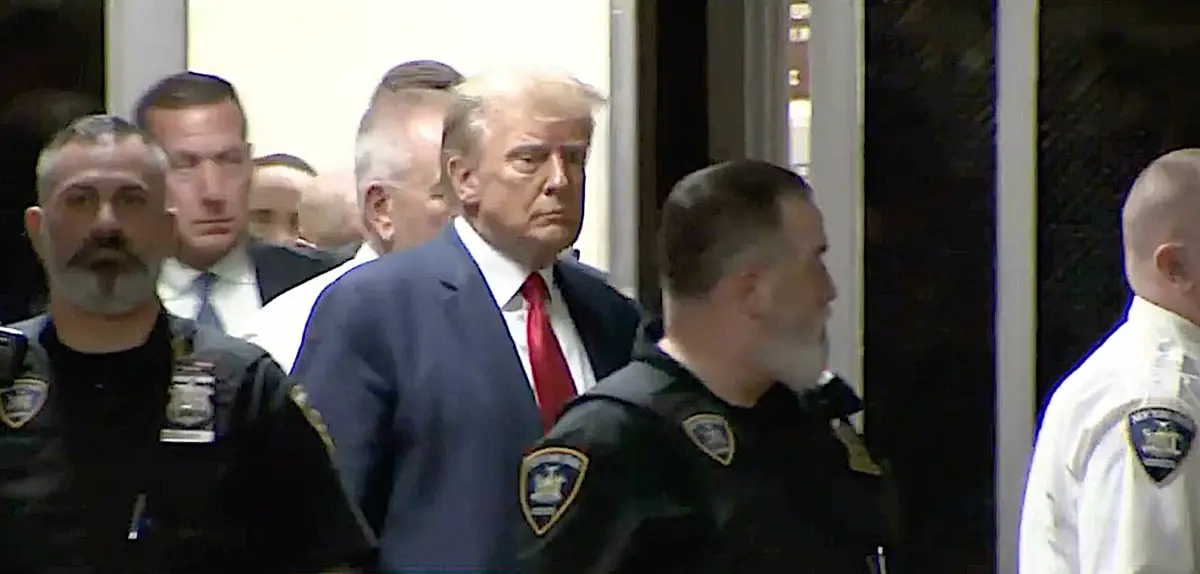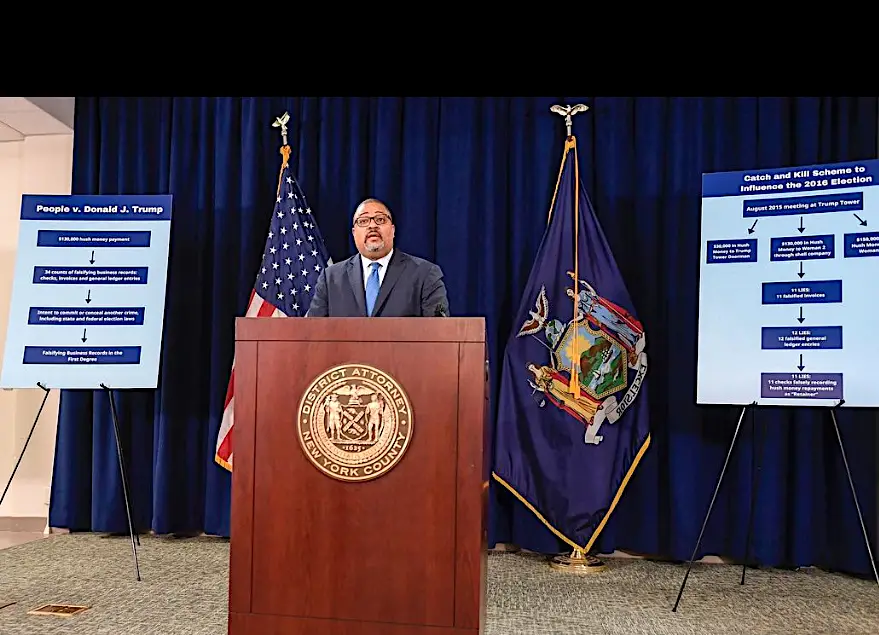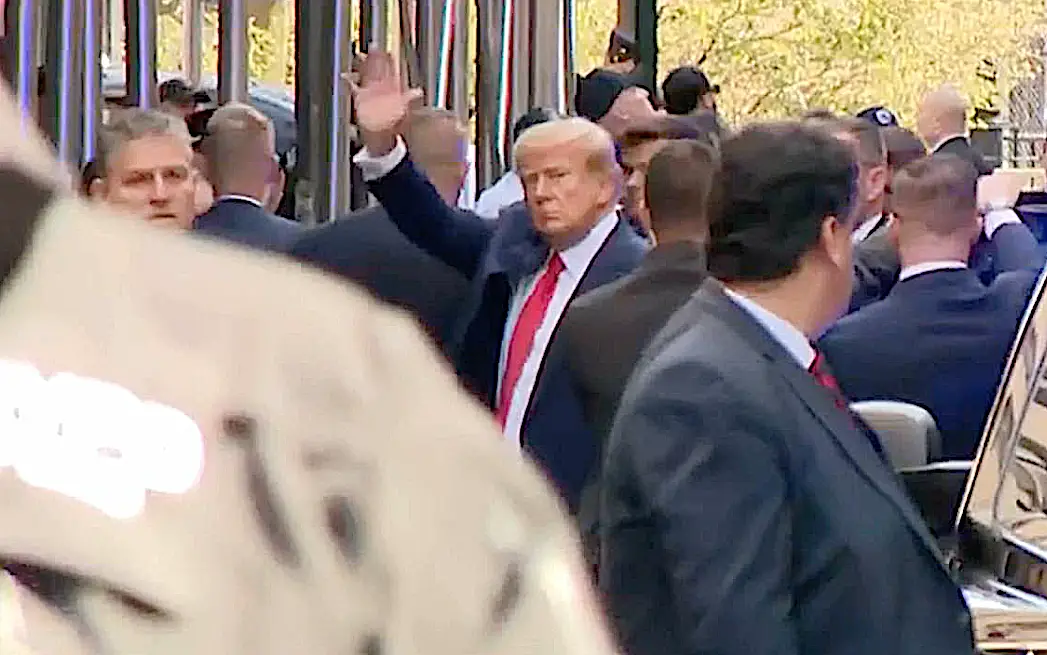Trump pleads “not guilty” to charges in indictment
In what was an historic event for the U.S., Donald Trump on April 4 entered a plea of “not guilty” to charges in a New York State Supreme Court indictment. The indictment charged Trump with 34 counts of falsifying business records in the first degree. Manhattan District Attorney Alvin Bragg’s office had obtained the indictment from a grand jury.

It marked the first time that a U.S. president or ex-president had been criminally indicted. It’s alleged that Trump falsified New York business records in order to conceal damaging information and unlawful activity from American voters before and after the 2016 election.
Trump, age 76, appeared in Manhattan Criminal Court where he was advised that he was under arrest and was booked and fingerprinted. Rather than being put in a holding cell Trump was allowed to wait in a meeting room until it was time for court to be in session. Trump entered a 15th floor courtroom at about 2:28 p.m. for his arraignment. The session lasted 57 minutes according to court records. New York Supreme Court Justice Juan Merchan presided at the arraignment. Trump did not make a statement to reporters as he entered the courtroom and had no statement on his way out.
Trump was hustled out of the courthouse and taken to LaGuardia Airport, where his private Boeing 757 jetliner was waiting to fly him back to Florida and his home at the Mar-a-Lago resort. Trump had flown to New York on April 3 and overnighted in the apartment that he keeps at Trump Tower on Fifth Avenue.
District Attorney Bragg was among those inside of the courtroom. Bragg held a news conference after the court proceedings in which he provided details on the indictment, which had been under seal since it was initially handed up by the grand jury.
“Manhattan is home to the country”™s most significant business market,” Bragg said. “We cannot allow New York businesses to manipulate their records to cover up criminal conduct.”

Bragg said that the Statement of Facts that accompanied the indictment describes a trail of money and lies exposing a pattern that it is alleged violate one of New York”™s basic and fundamental business laws. Bragg said that by taking the action against Trump his office was upholding its solemn responsibility to ensure that everyone stands equal before the law.
The indictment for falsifying business records in the first degree read, in part, “The defendant, in the County of New York and elsewhere, on or about February 14, 2017, with intent to defraud and intent to commit another crime and aid and conceal the commission thereof, made and caused a false entry in the business records of an enterprise, to wit, an invoice from Michael Cohen dated February 14, 2017, marked as a record of the Donald J. Trump Revocable Trust, and kept and maintained by the Trump Organization.” The indictment then went on to specify the additional counts.
The case concerns the payment of $130,000 to porn star Stormy Daniels to buy her silence about a sexual relationship she and Trump had. Former Trump Attorney Michael Cohen served prison time on federal charges connected with the payoff to Daniels.
The Statement of Facts that accompanied the indictment stated, in part, “From August 2015 to December 2017, the Defendant orchestrated a scheme with others to influence the 2016 presidential election by identifying and purchasing negative information about him to suppress its publication and benefit the Defendant”™s electoral prospects. In order to execute the unlawful scheme, the participants violated election laws and made and caused false entries in the business records of various entities in New York. The participants also took steps that mischaracterized, for tax purposes, the true nature of the payments made in furtherance of the scheme.”
The court documents provided information as background on a so-called “catch and kill” scheme that involved American Media, publisher of the tabloid National Enquirer, owned by Trump ally David Pecker. Under “catch and kill,” American Media would buy the exclusive rights to stories that could hurt Trump and then never publish those stories.
It’s alleged that in total, 11 checks were issued for a phony purpose. Nine of those checks were signed by Trump. Each check was processed by the Trump Organization and illegally disguised as a payment for legal services rendered pursuant to a non-existent retainer agreement, it is alleged.

Although Trump had been calling on his supporters to stage protests against the court case, police estimated that only a few hundred pro-Trump demonstrators showed up near the Manhattan courthouse. When far-right Republican Rep. Marjorie Taylor Greene of Georgia made a much-publicized appearance to support Trump, she began speaking but was drowned out by anti-Trump demonstrators and quickly left. Republican Rep. George Santos of New York was surrounded by news cameras and reporters and hurried away from the area without speaking to the crowd. Democratic Rep. Jamaal Bowman, whose district covers the southern half of Westchester expressed support for the judicial process and the principle that no person is above the law.
Judge Merchan set the next in-person hearing date for Dec. 4. It’s expected that Trump’s attorneys will file a motion asking that the indictment be dismissed.
Back at Mar-a-Lago on the night of his court appearance, Trump told about 500 of his supporters that the New York case is an attempt to interfere in elections by using the court system. He also attacked Judge Merchan and his wife and daughter as being biased against him.
While speaking at Mar-a-Lago, Trump also brought up the classified documents investigation, saying that the classified documents that he had taken from the White House were not really classified. Trump said that as soon as he removed them from the White House they automatically became declassified. He did not cite a law or government procedure that supports his claim.